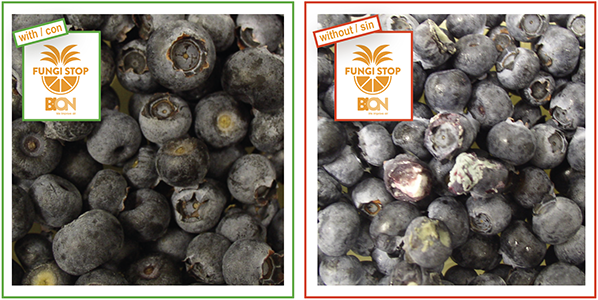FUNGI STOP keeps Blueberries Free of Botrytis
The blueberry (Vaccinium corymbosum) is a fruit highly appreciated for its intense flavor and color in the gastronomy of many countries.
It is a climacteric fruit that surprisingly behaves like a non-climacteric fruit. This is because, once harvested, its respiration rate drops considerably.
Blueberries are usually transported and marketed in micro-perforated clamshell boxes to avoid bruising and crush damage.
One of the most common diseases affecting blueberries is the botrytis fungus, which directly affects the softening of the skin, causing extensive damage to the fruit.
The botrytis fungus (botrytis cinerea) or gray mold is present in the harvest field although it becomes evident in the post-harvest stage.

Benefits of using FUNGI STOP on blueberries
INCREASES THE SHELF LIFE OF BLUEBERRIES.
REDUCES THE PRESENCE OF FUNGI: Fungi Stop works as a biological filter reducing the population of Botrytis spores suspended in the environment.
STOPS BLUEBERRY SENESCENCE: Due to the ethylene adsorption capabilities of BION's Fungi Stop media, senescence is not induced and blueberry skin weakening is stopped.
GREATER FIRMNESS: Fungi Stop keeps the fruit firmer and more resistant by preventing botrytis fungus from penetrating the blueberry skin.
CHEMICAL ADDITIVE FREE TECHNOLOGY: It is a chemical additive free technology that avoids the use of synthetic agrochemicals, making it safe and suitable for organic products.
For more information about FUNGI STOP and our post-harvest sachets visit: https://www.bioconservacion.com/postharvest-sachets